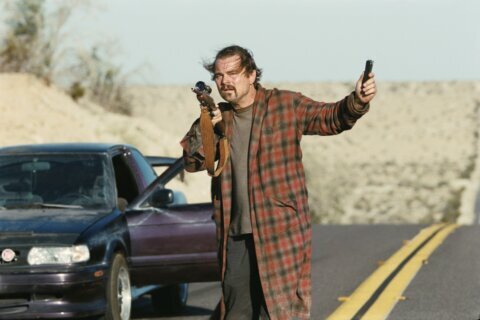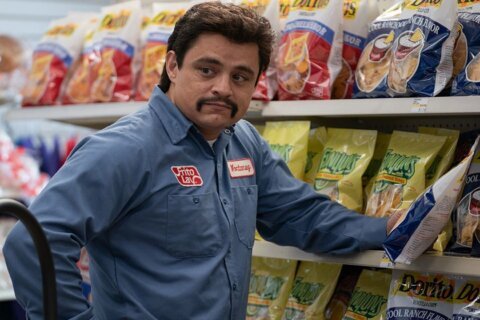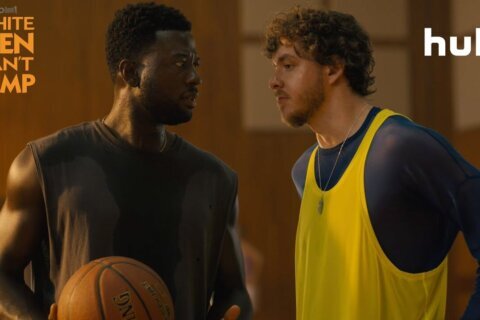Jason Fraley, WTOP film critic
WASHINGTON – Jackie Robinson was inducted into the Baseball Hall of Fame the year Atticus defended a different Robinson in “To Kill a Mockingbird” (1962). I was born a rural white kid the same year Jackie’s favorite teammate, Pee Wee Reese, was inducted (1984). And the year of the L.A. riots (1992), I was a mere second grader assigned to write a biography on No. 42.
For a kid who grew up wanting to “Be Like Mike,” the idea of black athletes unable to participate blew my young mind, eliciting the classic child response: that’s not fair. I was immediately hooked on Robinson and a new idol was born.
Flash forward to last week at the White House where the cast of “42” joined First Lady Michelle Obama and Robinson’s 90-year-old widow Rachel for a Q&A with students from Watkins Mill High School in Gaithersburg, Thurgood Marshall Academy in D.C. and T.C. Williams High School in Alexandria – the subject of Disney’s “Remember the Titans” (2000).
The spectre of “Titans” hangs over “42,” as 21st century Hollywood runs the risk of overdoing the race redemption sports biopic, from “Glory Road” (2006) to “The Express” (2008) to “The Blind Side” (2009). My counter to this argument is that Jackie Robinson’s story is the story on this subject, surprisingly only tackled once in “The Jackie Robinson Story” (1950), starring Robinson as himself in a rushed-to-the-screen production to capitalize on his 1949 MVP season.
Thus, “42” provides Hollywood’s first hindsight account. Writer/director Brian Helgeland, Oscar-winning co-writer of “L.A. Confidential,” chronicles the 1947 decision by Brooklyn Dodgers owner Branch Rickey (Harrison Ford) to bring the first black ballplayer to the major leagues. In a scene reminiscent of Apollo Creed looking for his Italian Stallion opponent in “Rocky” (1976), Rickey combs through his Negro League options, from Roy Campanella to Satchel Paige (a minor league backstop even reads “Balboa”). He settles on Jackie Robinson (Chadwick Boseman) for his on-field electricity and off-field grit, hoping he has the discipline to keep his cool amid the storm of change.
I applaud the choice of casting an unknown face to play Robinson, allowing us to embrace the character in a way we couldn’t with Jamie Foxx or Denzel Washington. Boseman, a Howard University alum, delivers a strong performance, particularly during a scene where he endures a relentless string of N-word taunts from a Phillies manager (Alan Tudyk). Boseman’s face shows the slurs are getting into his head, but rather than explode in public, he finishes his at-bat and heads into the locker room. Out of sight and out of mind, he smashes his bat in a stadium tunnel (years before Mean Joe Greene tossed his jersey), releasing primal cries that play much better in the movie than in the Jay-Z trailer.
Boseman chose this scene for his audition piece, catching Helgeland’s attention by smashing a plastic wiffleball bat against a chair in the audition room. When one of last week’s young White House guests asked how the film has changed his career, Boseman said, “In what way has it not changed my career?” From now on, he’ll now be known as Jackie Robinson. He earned it.
Harrison Ford said he wanted to disappear into the role of Branch Rickey, and he damn near does. Ford commits to the role, wearing a fat suit and changing his voice to deliver sage advice. He presents Rickey as human, saying his initial goal was not black or white, but the “green” of attracting more urban baseball fans, while admitting he was haunted by the injustice against a former black teammate.
Through it all, Ford taps into Jackie’s faith (“He’s a Methodist. I’m a Methodist. God’s a Methodist”), teaching him to “turn the other cheek” like Christ, the same message of non-violence adopted by Gandhi and Dr. King. When he appears to Jackie in his lowest moment in the tunnel, he feels as if a moral angel of the universe, a dove carrying Noah’s twig, a regular Olive Branch Rickey.
The rest of the supporting cast is top notch. John C. McGinley (“Platoon”) steals the show as the Brooklyn Dodgers quirky play-by-play announcer Red Barber. Christopher Meloni (“Law & Order: SVU”) is stellar as the womanizing manager Leo Durocher, who squashes a player petition.
Lucas Black (“Friday Night Lights”) shines as Reese, silencing racist chants by putting his arm around Jackie: “My parents are in the crowd. I want them to see what kind of man I am.” And Nicole Beharie (“Shame”) is wholesomely gorgeous as Rachel Robinson (originally played by Ruby Dee).
Despite the solid acting, I wish we would have seen a more complex portrait of Jackie and Rachel’s marriage. Perhaps the filmmakers didn’t want to offend the real Rachel Robinson, who served as a consultant on the movie. Helgeland hilariously described Rachel’s first reaction to reading the original script, taking issue with a scene where Jackie scores on a pitcher’s balk.
“It’s so hard to understand that I had Mrs. Robinson’s character turn to (sportswriter) Wendell Smith and say, ‘What happened?’ And he describes the balk to her,” Helgeland said.
“(Mrs. Robinson) came in. … She had a script that had folded corners and post-it notes sticking out of it. … She said, ‘I read the script … In what world do you think I don’t know what a balk is?'”
This exchange says everything you need to know about “42.”
On the one hand, the film strives for authenticity, passing the “smell test” of realistic on-field action with high-and-tight fastballs that’ll make you cower in your seat. Baseball fans will also love the recreation of Brooklyn’s Ebbets Field, Jersey City’s Roosevelt Stadium, Birmingham’s Rickwood Field and Pittsburgh’s Forbes Field (the butt of many jokes in the film). These period visuals are brought to life by cinematographer Don Burgess, who shot Forrest and Bubba’s first bus encounter in “Gump,” echoing Jackie’s Army discharge for refusing to sit in the back of a bus, 11 years before Rosa Parks.
On the other hand, the balk exposition highlights a penchant for corny hand-holding, offering eye-rolling cheese from child actors who pray for Jackie with over-the-top idealism. This is more a problem with Helgeland’s directing (“A Knight’s Tale”) than his writing (“Mystic River”). It’s a far safer treatment than the one rumored in the ’90s by Spike Lee, who wore the “42” jersey in “Do The Right Thing” (1989). While Boseman does his best DeNiro, smashing a bat like Jake LaMotta’s head, Scorsese would have followed Robinson back out of the tunnel in a “Raging Bull” single-take.
Helgeland wants to play it “safe,” but you have to take a risk to steal a cinematic base. This keeps “42” from being a “great” film, but it’s good enough to be shown in schools for years to come. This may be the audience Helgeland has in mind, opening with a history lesson of black soldiers fighting against the Nazis abroad but returning to white supremacy at home, and closing with a “where are they now” montage of baseball stats, noting the number “42” is the only number retired by all of baseball.
The almost mythic status of Robinson’s broken color barrier often overshadows his athleticism. In 1941, he became the first athlete in UCLA history to letter in four sports (baseball, football, basketball and track) in the same year. He led the Dodgers to six National League pennants and a World Series title in 1955. He was named the 1947 Rookie of the Year and 1949 NL MVP, leading the league in hitting (.342) and steals (37). And he was a holy terror on the base paths, stealing home 19 times, scoring more than 100 runs six times and leading second basemen in double plays four times.
And yet, his contributions transcend baseball, reminding us that pop culture is always ahead of our politics, from Run DMC breaking down Aerosmith walls, to Bill Cosby raising a black TV family in white living rooms. Jackie Robinson opened the floodgates of African Americans in sports, creating a generation of white sandlot kids pretending to be black ballplayers, and used his post-baseball career to work for racial equality. During the recent Supreme Court debate on gay marriage, NBC’s “Meet the Press” replayed a 1957 interview with Robinson on the issue of Civil Rights:
“When they say that the NAACP is moving too fast — you know, I heard that, Mr. Spivak, when I was out in Pasadena, California, trying to get into the YMCA: ‘Take your time. Be patient.’ Patience is fine. I think if we go back and check our record, the Negro has proven beyond a doubt that we have been more than patient in seeking our rights as American citizens. ‘Be patient,’ I was told as a kid. I keep hearing that today, ‘Let’s be patient; let’s take our time; things will come.’ It seems to me, the Civil War has been over about 93 years. If that isn’t patience, I don’t know what is.”
The real-life Robinson saw that reporter’s question coming from a mile away, kept his weight back and delivered a grand slam answer. He followed the advice given by the black sportswriter Wendell Smith: learn to see reporter questions coming in slowly, like a pitcher’s delivery, so that you’re ready with an intelligent response. The same goes for audiences of “42.” We can see the plot “curves” coming from a mile away, but more often than not, the movie meets them with a base hit, getting the job done with simple bleeders into the outfield, but occasionally smacking an emotional home run.
★ ★ ★
The above rating is based on a 4-star scale. Follow WTOP Film Critic Jason Fraley on Twitter @AboveTheJFray or on his blog The Film Spectrum.








